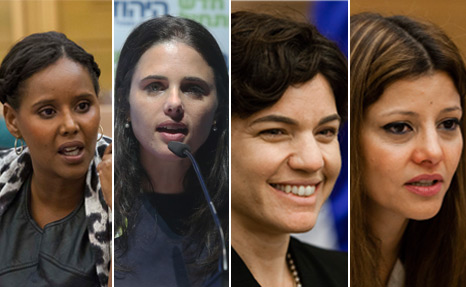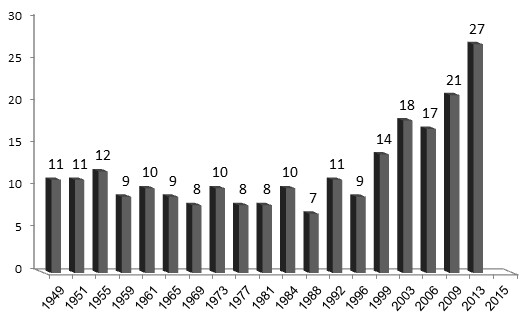Women's Representation in the Knesset: Still Increasing But Not Fast Enough
Dr. Ofer Kenig analyzes the predicted rate of representation of women in the 20th Knesset as compared to previous Knessets and as compared to the rate of women's representation in the parliaments of other democracies.

The issue of the representation of women in the political arena in Israel has been at the center of public debate and research for over a decade. Underlying this debate is the premise that the representation of women in politics, and especially in parliament, is of great importance, since it is in accordance with the values of representation and equality and it helps instill the concept that women are citizens who are of equal value to men.
What is the level of representation of women in Israeli politics?
On the one hand, Israel can take pride in its record of inclusion of women in politics. Equal suffrage was granted to women as far back as the first elections for the Assembly of Representatives of the Yishuv (the Jewish community) in Eretz Yisrael in 1920. This was one of the earliest examples of the extensions of suffrage for women in the world. While women in the United States also won the right to vote in that same year, in Spain and Portugal they were denied the right to vote until the beginning of the 1930s, in France and Italy they were only granted the right in the 1940s, and in Switzerland it took until 1971 for them to receive the vote. The State of Israel was also one of the first democracies in the world in which a woman reached the highest level of leadership: Golda Meir became prime minister of Israel in 1969. Only two women in the world, in India and in Sri Lanka, achieved that position in their countries before her.
In the last decade, women have been appointed to several senior key positions in Israel and have broken the male hegemony. Two women have served as President of the Supreme Court (former president Dorit Beinisch and current President Miriam Naor), a woman has served as Speaker of the Knesset (Dalia Itzik), and a woman has been appointed to the position of Governor of the Bank of Israel for the first time (Karnit Flug).
On the other hand, women's representation in the Knesset was very low for many years. An IDI study on the representation of women in Israeli politics that analyzed the issue from a comparative perspective found that the proportion of women in the Knesset is rising steadily and significantly. In the span of 25 years, the number of women in the Knesset rose from a low of seven after the elections of 1988 to a peak of 27 in the 2013 elections for the 19th Knesset (see Figure 1). The party that had the largest number of women in the outgoing Knesset was Yesh Atid, with eight women among its 19 members of Knesset. The Likud Beytenu faction had seven female members of Knesset out of a total of 31 MKs, while the Labor Party had four female MKs out of a total of 15. Meretz was the only faction in the outgoing Knesset that had equal representation of both genders. In contrast, three factions excluded women completely and did not even include any women as candidates on their list: Shas, United Torah Judaism, and Ra'am-Ta'al.
Figure 1: The Number of Women Knesset Members in Each Knesset (at the time of the Knesset's election)

According to the most recent public opinion polls, it is expected that the 20th Knesset, which will be elected on the 17th of March, will maintain the record high level of women's representation in the Knesset that was reached in 2013. An analysis of four surveys conducted from February 24–27, 2015, which cross-checked the candidates on each list, revealed that the number of women who are expected to be elected to the 20th Knesset will be in the range of 26–28. The chances that there will be fewer women than this in the Knesset are slim (unless Meretz fails to pass the electoral threshold), while there are certain scenarios in which it is possible that the number of women in the Knesset could exceed 30.
If we assume that 28 women will be elected to the next Knesset, the rate of representation of women will be 23.3% of the total members of the Knesset. As of today, this rate will rank Israel only in 70th place out of all the countries in the world. In other words, there are 69 countries where the proportion of women in parliament is higher than it is in Israel. As can be seen from Table 1, although this number of women would be a slight improvement in the percentage of women in the Knesset, Israel's ranking internationally is actually likely to decrease from the peak rate that it had reached in 2013.
The Percentage of Women in Parliament:
Israel's Position as Compared to the World
| 2006 | 2009 | 2013 | 2015 (Estimated) | |
| Number of Women | 17 | 21 | 27 | 28 |
| Percentage of Women | 14.2% | 17.5% | 22.5% | 23.3% |
| Ranking in the World | 90 | 80 | 64 | 70 |
* Source: The author's calculation based on the website of the Inter-Parliamentary Union's website, www.ipu.org
The drop in Israel's international ranking that is expected despite the (slight) increase in the representation of women in the Knesset indicates that the rate of improvement in the representation of women in the Knesset is far from satisfactory and that Israel is lagging behind the global trend in this area. If the predictions are correct, in the last two years, six countries will have "overtaken" Israel. After several significant leaps forward in the international ranking, Israel is regressing.
Thus, the road to gender equality in the political arena in Israel is still long. Even if we assume that it is not possible to reach total equality in Israel, since there are political parties that exclude women from serving in the Knesset, steps must be taken to incentivize parties to include more women in their lists candidates for the Knesset. In the policy paper cited above, which was published in mid-2013, IDI's research team issued the following key recommendations:
- To call on Israel's political parties to adopt quotas for the representation of women at their own initiative. The parties should undertake that at least 40% of the candidates on their list will be women and that there will be at least two women in every five candidates on the list.
- To amend Israel's Party Finance Law in a way that will use increased funding in order to reward parties that include at least 30% women and 30% men on their lists of candidates and at least three members of each sex in every 10 candidates. It should be noted that a similar mechanism has been approved by the Knesset for lists of candidates in local elections.
Dr. Ofer Kenig is a Research Fellow at the Israel Democracy Institute and a senior lecturer at the Ashkelon Academic College.
